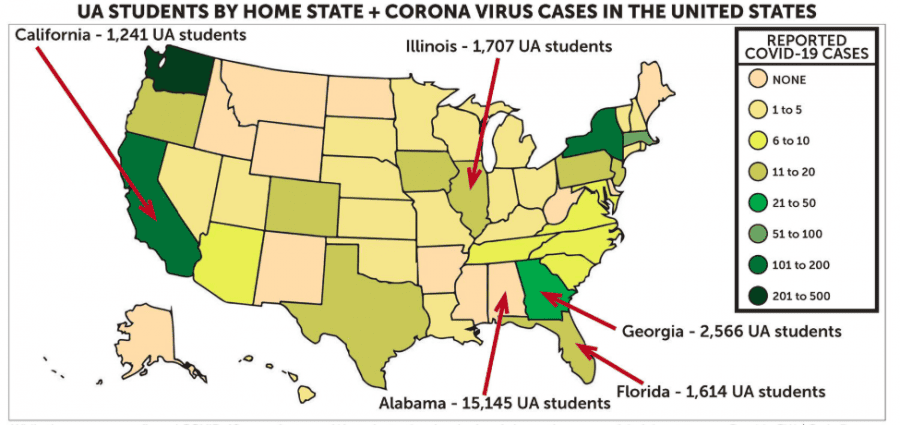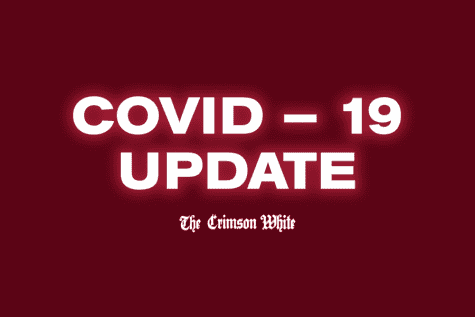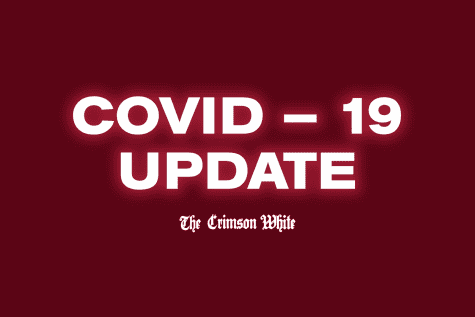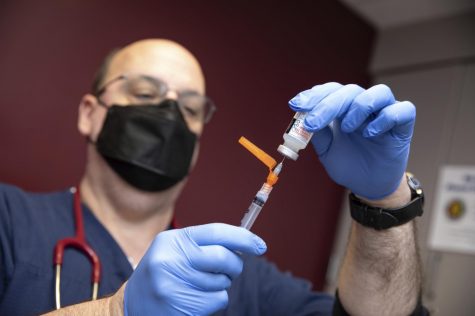COVID-19 corrupts, cancels spring break plans
While there are no confirmed COVID-19 cases among UA students, the virus is already affecting their hometowns. CW / Carly Farmer.
March 12, 2020
Concerns over COVID-19 continue to wreak havoc on students’ spring break plans, turning exciting vacations or much-needed respites into stressful situations.
The University of Alabama notified students and faculty on Wednesday evening that they should be prepared for disruptions to campus operations and to transition to online-only classes.
“Although current plans call for maintaining normal campus operations, be advised that it is possible UA could move to alternative methods of delivery, including online-only classes at some point this semester based on the state of COVID-19 in Alabama,” the UA News email said.
The email did not specify if or when this would happen, but did advise students to plan ahead when they leave for spring break.
“Students are encouraged to plan ahead if they leave campus for spring break, and take what they would need (e.g., electronics, textbooks, class materials and valuables) in the event a transition to online learning would become necessary,” the UA News email said. “Students who choose to stay on campus during spring break will be accommodated.”
Concerns over COVID-19 have already derailed spring break plans for many students.
Rachel Moore, a freshman majoring in accounting and marketing, was excited to spend a relaxing week basking in the Florida sun on a white-sand beach. Instead, she will be making an impromptu spring break visit back home to Washington, where she’ll bring much-needed, and much cheaper, supplies to her family.
With Washington reporting 267 cases of COVID-19, more than any other state, Moore’s hometown of Sammamish (about 30 minutes east of Seattle) has turned into a ghost town, and the price of necessities like hand sanitizer has skyrocketed.
That’s why she’ll be bringing a few suitcases filled with the coveted substance with her.
“Stores are just completely empty,” Moore said. “You can’t get toilet paper, hand sanitizer, water, the necessities up there, so I’ve had to buy stuff like hand sanitizer down here and ship it home, and now I’ll bring some home with me. I have suitcases full of hand sanitizer.”
Moore is one of many University of Alabama students who have had their spring break plans disrupted, altered or completely canceled by the increasing threat of COVID-19.
Mackenzi Dugan, a senior majoring in news media, purchased tickets a month ago to fly to Seattle for spring break. She canceled the trip last week when Washington governor Jay Inslee issued a state of emergency. After having difficulty reaching Alaskan Airlines in an attempt to get her ticket refunded, Dugan was finally able to reschedule her flight for later in the year but was still out hundreds of dollars due to cancellations.
Concerns over COVID-19 are at the forefront of students’ minds and conversations, and they probably won’t go away once the break is over. With thousands of students traveling through crowded airports and cities all over the country next week, the likelihood that COVID-19 will be brought back to campus is increasing. Along with the students who will be traveling to vacation destinations like Florida, Texas, the Caribbean and more, many students will be returning to their home states. Since 56.5% of the University’s students are from out of state, many will be traveling to, or through, states like California, Illinois and New York that have reported numerous cases of COVID-19. By the time of publication, 38 states and the District of Columbia have reported cases.
The idea that COVID-19 could be brought back to Tuscaloosa is especially frightening to Honor Chotkowski. Chotkowski, a junior majoring in English, is immunocompromised, which means that her impaired immune system has a reduced ability of fighting off infection or disease. As soon as COVID-19 began to spread into the U.S., Chotkowski and her roommate pulled the plug on their spring break trip to see her aunt and uncle in San Francisco.
“The biggest fear was flying there,” Chotkowski said. “We were going to fly out of Atlanta, and it’s just the claustrophobia that we’d feel on the plane and the discomfort of being potentially surrounded by someone that is sick. Considering how easily this is spread, it’s very likely that anyone that goes to the University, or even us, could have contracted it.”
Even though Chotkowski will most likely spend her off-week hunkered down in Tuscaloosa, she’s still worried that the virus will work its way to her. For most UA students, that wouldn’t be a life-threatening issue, since COVID-19’s impact on college-aged people is similar to that of the common cold or flu. But for Chotkowski, contracting the disease would be extremely dangerous.
“Being in a situation in which I could get potentially seriously ill from this is pretty scary,” Chotkowski said. “Even now, when it’s not even here, I’ve been very cautious with people coughing around me and stuff.”
As a precaution, Chotkowski has already obtained a note from her primary care doctor in her home city of New York that will excuse her from classes for two weeks after the break. But even self-isolation won’t guarantee that she’ll be able to avoid COVID-19.
“I’m also concerned because after break, if they don’t cancel class, even if I’m self-isolated, I still have two roommates who will be going out and going to class who could bring it back home,” Chotkowski said.
Along with canceling all University-sponsored international travel scheduled for the month of March, the UA system is advising against any non-essential domestic travel. That won’t stop all students from traveling to vacation or returning home for the break, but the anxiety still looms.
“COVID-19 is like watching a slow-moving hurricane move toward you, not knowing if it will dissipate, how long it will last or how big the hit will be,” Steven Polunksy, the director of the Alabama Transportation Policy Research Center, said in an email. “Fewer people are flying, and airlines are having to adjust – JetBlue says demand for flights has fallen more in response to coronavirus than it did after 9/11. United reduced its international schedule by 20% and its domestic schedule by 10%.”
For those who will be flying or riding trains during spring break, Polunksy has some advice.
“Students need to check on a daily basis for updates, wherever they are and whatever their plans are, and have backup plans,” Polunsky said. “If traveling, limit exposure in highly traveled areas. Think about things you touch that lots of other people do and prepare accordingly. Be prepared for things to change. In England, baggage handlers at Heathrow Airport have tested positive for coronavirus. How would travel be affected if that happens in the U.S.?”
The UA System updated its interim emergency policy on Wednesday to include information about spring break. The update announced that students who decide to stay on campus will be accomodated, encouraged better hygiene practices and also declared that students who “develop respiratory symptoms” or “are exposed to an individual with or suspected of having COVID-19” should not return to campus after break. For those students, remote arrangements will be made. Students who are staying on campus are asked to notify the University.
More information on the University’s policies regarding travel can be found at healthinfo.ua.edu.









